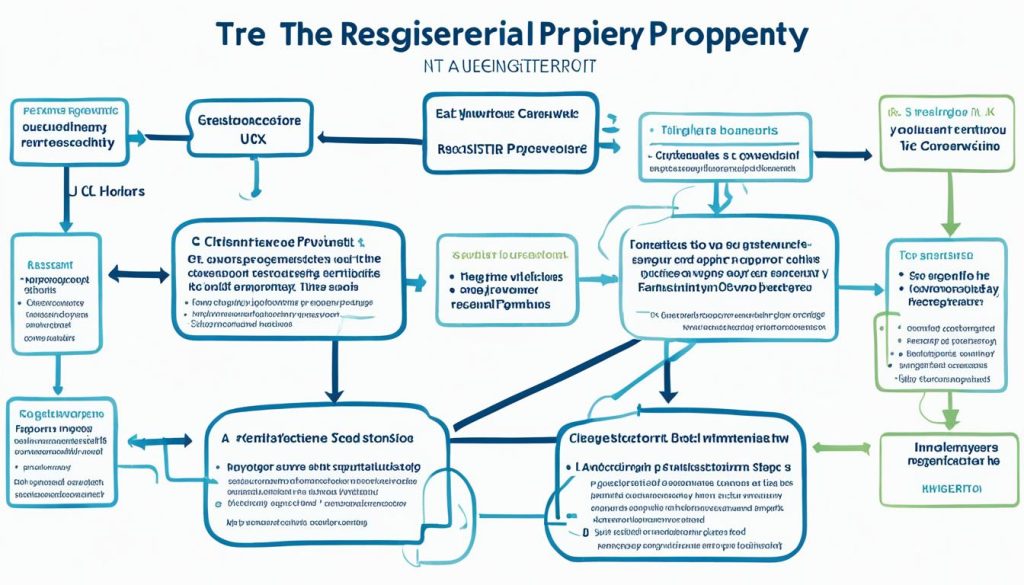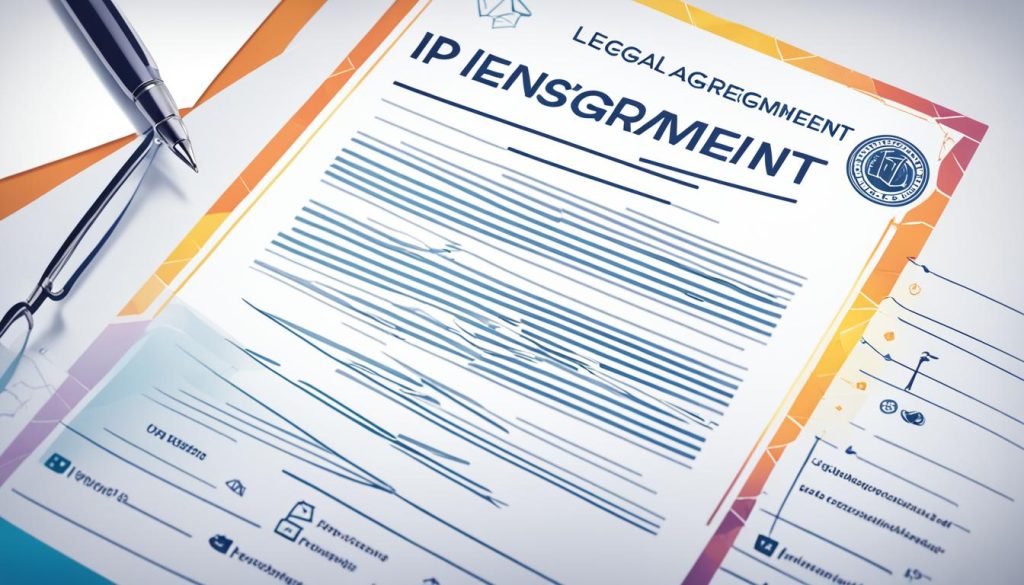It’s vital to know about UK intellectual property law if you’re creative. This knowledge helps protect your work, whether you’re an inventor or an artist. It supports the lively world of ideas and business today.
When dealing with IP rights in the UK, knowing your rights and duties is key. We’ll guide you through intellectual property’s complex world. This will help ensure your creations are protected and prosper in the UK’s thriving scene of innovation.
Understanding Intellectual Property in the UK

In the UK, understanding how to navigate intellectual property (IP) is key for innovators. This includes inventors, artists, and entrepreneurs. Knowing what IP means and the kinds of IP found in the UK is crucial. It helps protect your work and make the most of it. Let’s look into how IP rights work and the role of copyright and patent law in this.
What Constitutes Intellectual Property?
Intellectual property is about the ideas and creations from people’s minds. It covers a wide range, from new tech to art. Basically, if you create something unique, the law can help protect it from being used without your permission. This includes inventions, books, designs, and more. These creative outputs are kept safe under the law.
Types of Intellectual Property Rights
In the UK, there’s a solid system to protect creative works. Key types of IP include:
- Patents: These protect new inventions for up to 20 years, giving the owners exclusive rights.
- Trademarks: These safeguard symbols and names that show who made a product or service.
- Copyrights: Copyrights relate to the creation of art, music, literature, and software.
- Design Rights: These protect the look of objects that aren’t just functional.
These rights form a protective circle around your creations. They offer security and encourage you to keep innovating. Each IP right has its own rules and way to apply, controlled by copyright and patent law.
The Importance of Protecting Creative Works
Protecting creative works is essential. It gives creators control over their work and promotes innovation within society. This balance helps everyone, allowing for more creativity and invention.
Securing IP motivates investment in new creations, rewards inventiveness, and makes sure creators are rewarded. This legal protection fosters a lively marketplace for ideas, helping industries and the economy grow.
Creating Intellectual Property: What You Need to Know

When diving into creating IP in the fast-moving world, especially in places like the UK known for constant innovation, knowing the rules of intellectual property is key. This knowledge guards your ideas and boosts your business success. As you start creating and safeguarding your intellectual property, remember a few important tips.
-
Keep detailed records of your creation. They prove your work’s uniqueness, which is vital for IP creation.
-
Learn about different IP types. Knowing them helps you correctly protect your work under UK law.
-
Look out for IP early on. Spotting it during creation ensures you don’t miss protection chances.
It’s also critical to know what can and can’t be shielded by IP rights. Not every idea can be protected, making it important to understand this early. This saves time and prevents wasted efforts.
-
Ideas that are too common or lack detail are not protectable.
-
Be cautious about sharing your idea. Doing so without a confidentiality agreement can risk your IP rights.
Moreover, combining your creativity with careful IP planning not only protects you legally. It also helps your innovations boost the UK economy.
In the end, making IP successfully takes careful planning and understanding legal boundaries in the UK. Whether you’re inventing alone, starting a business, or developing products in a company, following these guidelines preserves your work’s worth and integrity.
Registration of Intellectual Property in the British System

Securing IP rights in the UK is simpler than you think. It involves steps like filing for patents and trademarks, securing design rights, and grasping copyright laws. This guide is here to help creators and entrepreneurs legally formalise their intellectual property easily.
Patents and How to Apply for Them
Protecting an invention is crucial. In the UK, start by making sure your invention is new, not obvious, and usable in industry. You must write detailed patent claims and check that it doesn’t copy existing patents. Then, you can apply at the UK Intellectual Property Office. Getting a patent usually takes a few years.
Trademark Registration Process
- First, make sure your trademark is unique and doesn’t collide with others by doing a thorough search.
- Then, apply for your trademark at the IPO, clearly stating what it will represent.
- After applying, your trademark is checked and shown publicly to allow any objections.
- If no one objects, you get the trademark with rights for 10 years, which you can renew.
Design Rights and Copyright Filing
Design rights in the UK are automatically yours when you create something new. For better protection, you can register your design with the IPO. This gives you exclusive rights for up to 25 years, with the chance to renew every 5 years. Copyright comes automatically with creation of new works like music or art. Yet, keeping good records and understanding your copyright is key for protecting your work.
The Role of Intellectual Property Office in the UK

The UK Intellectual Property Office (IPO) is essential in handling IP rights in Britain. It helps register intellectual property, enforce laws, and teach people about IP rights. This makes the IPO a key player in this area.
It’s a big part of the UK IPO’s job to make IP application easy and clear. This helps people and companies protect their new ideas. By doing this, the IPO supports economic growth and helps inventors earn from their work.
- Processing and Issuance of Patents, Trademarks, and Design Registrations
- Administration of Copyright Certifications
- IP Law Enforcement and Support with Dispute Resolutions
The UK Intellectual Property Office also shares a lot of information about IP. They offer guides and detailed studies to teach the public. Their dedication to educating people shows how the UK values intellectual property for a strong economy.
- Educational Resources and Training Seminars
- Online Guides and Publications
- Advice and Outreach Programs
When there are IP issues, the UK IPO helps sort out disputes. They work to stop IP theft and ensure fair competition. This effort helps keep the UK’s innovation scene honest and creative.
- Mediation and Arbitration Support
- Guidance on IP Policy and Strategy Formulation
- Liaison with International IP Authorities
The UK IPO stands at the intersection of creativity, business, and law. It ensures inventions are protected and valued in the UK and beyond. This keeps the UK innovative and forward-thinking.
Intellectual Property and Starting Your Business

Starting a business means knowing the importance of intellectual property (IP). For entrepreneurs, handling IP is crucial for safeguarding their ideas and standing out in the market. We’ll look at why an IP audit is important, how IP helps in business growth, and how some businesses use IP to succeed.
Conducting an Intellectual Property Audit
An IP audit checks the intellectual properties a business has, uses, or plans to acquire. It helps manage risks, solve issues, and find ways to grow the business. This check is vital for identifying and protecting valuable IP.
An audit does three main things:
- Shows existing IP and finds any IP not yet registered.
- Points out where IP rights are weak.
- Matches your IP plan with your business goals.
Understanding IP early on can help you protect your business and stay ahead of competitors.
Utilising Intellectual Property for Business Growth
Growth is key for any business, and IP can be a big help. You can use IP in many ways to help your business get bigger and better:
- IP can create barriers to keep competitors away.
- Strong IP can attract investors and funding.
- IP can improve your marketing and build your brand.
Using IP wisely can turn a regular business into a market leader.
Case Studies: Successful IP Strategies
Case studies show the real value of a good IP strategy. For example, Dyson leads in the home appliance market by protecting its technology and design. ARM Holdings is key in technology because of its patent strategy. These examples show the power of focusing on IP from the start.
Thinking about IP from the start can protect your ideas and guide your business to success. Starting with an IP audit, using IP for growth, and learning from successful IP strategies can set up new businesses to win in the competitive market.
Licensing and Intellectual Property

The world of intellectual property (IP) opens many doors for creators to benefit from their work. IP licensing is a way for owners to allow others to use their IP. They get royalties in return. This ensures a regular income while keeping their original work.
To make a good IP licensing deal, understanding the key terms is important. The main goal is getting the right royalty payments. These can be upfront cash, ongoing sales percentages, or both.
- Percentage royalties based on net sales
- Fixed amount per unit sold
- Lump-sum royalties
- Graduated royalty rates tied to sales targets
When thinking about an IP licensing deal, owners must protect their work. They should clearly set the use, time frame, and place for the license. They also need to state any use limits to keep the IP’s value high.
- Check if the potential user can effectively use and market the IP
- Work out a fair royalty rate
- Make the terms of use and exclusivity clear
- Think about allowing them to sublicense
While IP licensing can bring in money, it has its risks. There could be less control over the IP and arguments over the agreement’s terms. So, it’s crucial to do your homework. You might also want to get legal advice.
‘Intellectual Property and Your Work in the UK’ at a Glance

Understanding intellectual property (IP) rights in the UK can be tricky. There are many types of work, from freelance to full-time, each with its own IP challenges and chances. Knowing your rights and duties is vital, whether you’re working on your own or in a company. This summary will shed light on creators’ rights, employee IP agreements, and freelancer IP issues. It aims to help you protect your creative output.
Working as a Creator or Innovator
In the UK’s creative economy, creators and innovators are key. They need to protect their ideas and creations. Knowing about copyright and other IP rights that automatically protect original works is essential. Registering your IP can help avoid ownership disputes and provides extra legal protection.
Employees and Intellectual Property Rights
Employee IP agreements are common in job contracts. Usually, any IP made while you’re employed belongs to your employer. But, there are exceptions where some rights might stay with the employee. Knowing your employment contract well, especially the IP rights parts, is very important.
Freelancers and Intellectual Property Concerns
For freelancers, owning IP can be more complex, depending a lot on the contract details with their clients. It’s crucial that freelancer contracts clearly state which creations they can keep and which go to the client. Being careful in contract talks helps freelancers keep rights to their work.
In conclusion, your intellectual output is precious, no matter if you are a creator, employee, or freelancer in the UK. With the right knowledge and legal tools, you can safeguard your intellectual contributions. This ensures you get the credit and payment you deserve for your creations and inventions.
Breaches of Intellectual Property: Prevention and Redress

The threat of IP infringement can be really worrying for both creators and businesses. It challenges the foundation of their creative triumphs. To defend against copyright theft, it’s key to actively protect intellectual property. It’s about being aware and managing your IP well to keep your creative work safe.
Winning the fight against IP theft means knowing your rights and how to act on them. The first step is setting up measures that stop thieves and make the risks clear to them. We’ll look at how to keep your property safe and what to do if it gets stolen:
- Risk Assessment: Review your IP carefully to spot any weak spots. Check your IP assets and review licensing agreements often.
- Clear Marking: Use copyright notices or patent numbers on your work. This warns off thieves and tells the public you own your work.
- Monitoring: Keep an eye on the market for any unauthorized use of your work. Use tech and experts to spot any wrong use.
If someone steals your IP, you need to react fast. Usually, you should do the following:
- Send a cease and desist letter to tell the offender you know and will act.
- Get advice from a solicitor who knows about IP law to help you navigate through.
- If you must, start legal action to fix the situation. This can lead to court orders or even compensation.
Also, it’s vital to know about ‘fair use’, which allows some use of copyrighted material without it being theft. Knowing this helps IP owners spot real theft from legal use.
In the end, protecting your IP is about being alert, making smart moves, and being ready to stand up for your rights. Balancing defensive actions with assertive steps is key to keeping your assets safe.
International Considerations for British Intellectual Property

In today’s world, UK businesses and creators need to grasp international IP laws well. This is vital for those aiming to share their innovations globally. Knowing about both local and worldwide legal settings is crucial due to the broad scope of intellectual property protection.
Understanding Global IP Frameworks
Several key frameworks form the basis of international IP protection. They help protect trademarks, patents, and designs outside the UK. The Paris Convention creates a protective union for intellectual property. Meanwhile, the Madrid System simplifies trademark registration in many countries. These systems work together, supporting IP rights worldwide.
How Brexit Affects UK Intellectual Property
Brexit has majorly impacted UK intellectual property. Leaving the EU has made the UK rethink its role and agreements regarding EU-wide IP rights. Changes, especially in trademark and design rights, have forced UK firms to quickly adjust. They need this to maintain protection in European markets. The shift to new rules shows the complexity of Brexit IP implications for UK holders.
Enforcing Your IP Rights Abroad
Global IP enforcement presents unique challenges for British organizations. Protecting and enforcing IP rights globally means facing different legal systems. It requires using international treaties to your benefit. Having a strong plan for action abroad is essential. This plan should include help from local legal experts and international IP bodies. This ensures the worth of British innovations is recognized overseas.
- Know international treaties and agreements well.
- Get advice on local IP laws where you want to enforce rights.
- Apply international rules to protect your IP.
For British IP owners aiming at the global market, understanding these international aspects is key.
Resolving Intellectual Property Disputes
Protecting your creative work is vital. Knowing how to solve IP disputes can save you both time and money. It’s critical to be prepared and seek early advice. This can help navigate through the complex world of IP litigation.
Mediation in IP conflicts is a softer and less costly way to solve disputes. It helps find solutions that work for everyone while keeping relationships and secrets safe. Through mediation, settlements are customized to fit what each party needs and wants.
Sometimes, you must take disputes to court. Intellectual property litigation is about solving conflicts legally. It’s often long and costly but necessary for serious issues or when other methods fail.
- Starting with informal talks can lead to a friendly agreement without formal legal action.
- Mediation: It’s when a neutral person helps reach a settlement.
- Arbitration: An arbitrator decides on the dispute, and everyone must follow it.
- Litigation: This means taking the dispute to court for a legal decision. It’s more public and expensive but sometimes needed.
Choosing mediation or court depends on understanding your situation’s pros and cons. IP disputes are tough. Yet, with the right help and information, you can navigate through them. Doing so can protect your rights and prove your points.
- Getting advice early can prevent problems from getting bigger.
- Using ADR like mediation helps save time and keep relationships.
- Sometimes, you must fight in court to defend your rights strongly.
Deciding how to resolve IP disputes needs careful thought. Consider both the outcomes and how they affect your work or business. As the worlds of tech and creativity grow, so does the importance of strong strategies for managing IP conflicts.
Intellectual Property: The Digital Age Challenges
The internet and new tech have changed how we handle intellectual property (IP). Copyright rules and the idea of ownership are hard to manage today. We need new ways to protect and enforce IP.
Online Content and Copyright Issues
More people are talking about copyright issues in the digital world. With most content shared online, it’s harder to manage IP rights. Copyright laws must evolve to keep up with how fast content spreads and is accessed.
Defending IP in the World of Social Media
Social media has changed the way we talk, share, and do business. But, it poses challenges for managing IP rights. The quick spread of content can lead to IP problems across different places. Quick and careful action is crucial to protect creative work online.
Emerging Technologies and IP Considerations
New tech like artificial intelligence and blockchain brings up new IP questions. They make us think about who the author is and who owns something. We need flexible IP laws that recognize new ways of making and sharing, ensuring creators get paid and credited.
The move to digital means we must look at IP differently. Everyone involved needs to be ready to talk and act to face these challenges. This will help make a fair digital world for everyone.
Intellectual Property Education and Resources
Understanding intellectual property (IP) is key. We need valuable resources to help us grasp and manage IP rights effectively. There are many learning options for those eager to improve their knowledge in this area.
Government and Educational Programmes on IP
The UK government and educational institutions offer IP training programmes. These help creators, entrepreneurs, and companies understand and use IP strategies well. The Intellectual Property Office has initiatives for advice and support, boosting innovation and protecting creative works.
Online IP Courses and Workshops
Thanks to the internet, IP education is more within reach. There are online courses and workshops for learning about IP law and management from home. These courses suit everyone, from beginners to those more experienced, ensuring everyone can learn thoroughly.
Publications and Guides for IP Owners
Besides courses, there are lots of IP guides and publications. Written by field experts, these resources are perfect for learning on your own. They help explain IP from basic ideas to complicated practices, giving owners and creators key insights.
Financing and Intellectual Property
In the world of innovation, getting financial support is as key as protecting your creative works. This section sheds light on how money and intellectual property (IP) work together. It highlights their role for UK businesses and innovators.
Today’s market looks for bright ideas and the funds to bring them to life. Therefore, getting finance is crucial for an IP asset’s growth journey. How can you make your IP an attractive investment? This involves cleverly handling your IP.
- Understanding the value of IP assets within a business model
- Maximising IP portfolio to attract investors
- Utilising IP as collateral for funding opportunities
- Exploring government grants and incentives for IP development
- Navigating through venture capital and IP considerations
When investors think of giving capital, they check the potential profits. Well-managed IP assets show a company’s special offerings and market position. This becomes key in investment decisions.
We should not forget the government grants and incentives for innovation. Tied to IP requirements, they help businesses grow without losing ownership.
Venture capital also focuses on a startup’s IP strength and market potential. Strong legal protection and market uniqueness make IP a treasure for startups.
Ultimately, intellectual property is more than legal protection—it’s a vital business resource. If managed well, it can open up vast financial opportunities.
Intellectual Property and Collaborative Projects
When working together on projects, handling intellectual property (IP) correctly is crucial. It helps maintain peace and protects new ideas. Since collaboration combines different skills, ideas, and resources, it’s important to be clear about IP right from the start.
-
Deciding who owns what IP is vital. People working together must talk and write down their rights to prevent any disputes.
-
It’s also key to set rules on how everyone will share the IP made together. This helps avoid issues and supports a good working environment.
-
There may be a need to apply for IP protection together for any joint creations. This step makes sure everyone is acknowledged and safeguarded.
Using non-disclosure agreements (NDAs) is common, especially at the beginning. NDAs are crucial for keeping shared information safe before any official deal is made.
-
It’s important to appreciate each person’s contribution and decide how it will be reflected in the IP rights given.
-
Thinking ahead about how to handle new developments and possible growth within the partnership is necessary.
-
Everyone should agree on the maintenance of the shared IP, who will cover the costs, and how to deal with any outside breaches.
Collaborative projects can drive innovation and have a big effect on the market. But without solid IP agreements, misunderstandings and lost chances can happen. Getting legal advice to make sure all agreements clearly state IP terms is a smart move to protect everyone’s interests.
Conclusion
We’ve come to the end of our journey through intellectual property in the UK. It’s vital to understand that although we didn’t cover Sections 14, 15, and 16, the basics of IP are key. They’re important for anyone starting their creative or entrepreneurial path. Knowing how to protect your ideas and navigate IP law is essential.
Our exploration has shown the UK’s IP landscape to be intricate and constantly evolving. It’s full of both opportunities and challenges. This calls for careful planning and strategic action. Remembering what we’ve discussed can guide people who create, innovate, and aim to make the most of their intellectual assets.
Even though we didn’t delve into Sections 14, 15, and 16, you now know the core concepts and steps to manage IP wisely. In today’s fast-paced digital world and interconnected markets, mastering IP protection and use isn’t just wise. It’s a must for achieving success.
















